Elliott School Professor Elected Member of the Council on Foreign Relations
The prestigious membership recognizes leadership in foreign policy and global affairs.


Elliott School Professor Elected Member of the Council on Foreign Relations
The prestigious membership recognizes leadership in foreign policy and global affairs.

GW Education Leadership Fellows Use Data to Drive Success in D.C. Schools
The GSEHD Educational Leadership and Administration program empowers educators to identify access gaps, implement action research projects and lead measurable change.

Forging a Link between Food and Health
At the Good Food for All Summit, national leaders, innovators, advocates explored solutions linking nutrition access to health, dignity and community transformation.
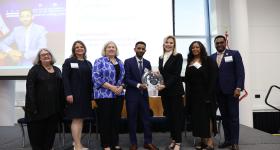
Calvin Cafritz Awards Celebrate D.C. Government Employees Driving Innovation and Impact
This year’s winners were honored for groundbreaking work that improved public health, enhanced accessibility and supported vulnerable communities across the District.
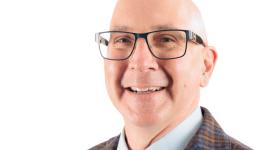
GSEHD Professor Elected President-Elect of Virginia Counselors Association
Rob Froehlich will lead the statewide professional organization beginning in 2026.

GW Law Alumna Nominated to U.S. Court of Appeals
Whitney Hermandorfer, J.D. ’15, is President Trump’s first judicial pick of his second term.

Women Leaders in the World of Diplomacy
The 25th annual Women’s Leadership Conference presented a panel of women diplomats who discussed navigating global relations.

The goal of the initiative is to bring together educators, policymakers and scholars to strengthen democratic values in education.

Lerner and Shenkman have served the university in multiple capacities, while Norton is a longtime activist on behalf of civil rights.

New Report: Federal Medicaid and SNAP Cuts Could Result in 1 Million Jobs Lost
Severe economic consequences projected across all 50 states, including billions in lost tax revenue.

GW Hosts Former U.S. Rep. Fred Upton in Conversation
The former Republican congressman, known for his independence, is worried about the present but hopeful for the future.

GW Alum Elected as President of the National Association of Attorneys General
As NAAG president, John Formella will launch an initiative to combat substance abuse and drug trafficking.
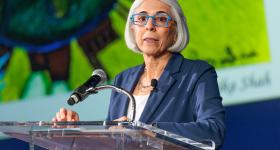
White House Adviser Arati Prabhakar Discusses AI, Climate Change and Promoting Health
President Biden’s director of the Office of Science and Technology Policy talked about her work in the White House, what’s ahead in technology in a conversation with GW President Granberg.

José Andrés Awarded Presidential Medal of Freedom
President Biden presented the world-renowned chef, humanitarian and founder of GW’s Global Food Institute with the nation’s highest civilian honor.

The prestigious award, presented by George Washington University's Institute for Public Diplomacy and Global Communication, recognizes Duckworth's outstanding contributions to U.S. diplomacy and...
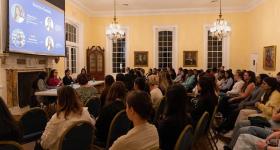
Women in Government: Breaking Barriers behind the Scenes
A GW Women’s Leadership Program panel shares advice on securing work in the federal government.
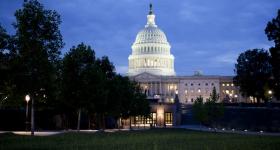
Eleven GW Alumni Win Congressional Races, Including One New Member of the House
John Olszewski was elected to the House for the first time, and Elizabeth Warren returns to the Senate.
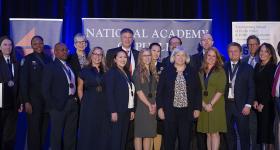
Flemming Awards Marked 75 Years of Honoring Government Service Excellence
In partnership with TSPPPA, the awards recognized accomplishments including combating human trafficking and improving addiction treatment.
President LeBlanc Letter on D.C. Statehood
Dear Chairman Cummings and Ranking Member Jordan,
I write today to express the George...
Marion Barry Oral History Project to be housed at Gelman Library
Veterans of Barry’s first campaign for mayor in 1978 jointed with George Washington University’s Gelman...
Members of Congress, Staff Cross the Aisle at GW Alumni Reception
Six members of Congress with connections to the George Washington University spoke at an annual Capitol...
Harry Reid, JD '64, Leaves The Senate
After 30 years in the Senate—and at least as many tussles and tangos—the chamber’s highest-ranking...
GSPM Alumni Talk Working on Capitol Hill, Tips for Job Seekers
Current and former chiefs of staff spoke about how they got their start on Capitol Hill and the impact...
Infrastructure, Economic Diversification Are Priorities for D.C. Region Leaders
George Washington University President Steven Knapp moderated a frank, sometimes contentious discussion...
Five George Washington University alumni have been newly-elected or re-elected to seats in Congress...
Kevin Pelphrey Installed as Carbonell Family Professor in Autism
Dr. Pelphrey, director of George Washington University’s Autism and Neurodevelopmental Disorders...
Takeaways from Second Presidential Debate
Presidential candidates Hillary Clinton and Donald Trump faced off at Washington University in St....
Dec. 15 Marks 200 Years of GW Commencements - December 13th, 2024
Eleven GW Alumni Win Congressional Races, Including One New Member of the House - November 21st, 2024
‘Democracy Dialogue’ Reflects GW’s Founding Vision - October 22nd, 2024
GSPM Presents Alumni Lifetime Achievement Award to U.S. Navy Secretary Carlos Del Toro - September 26th, 2024
GW Law Associate Dean Elected to Governing Council of ABA - August 23rd, 2024
GW Partners with D.C.’s Department of Public Works to Collect Organic Waste - July 2nd, 2024
Board of Trustees Elects Three New Members - June 16th, 2024
‘Perfect is Boring’: Jen Psaki Inspires Graduates to Embrace Mistakes - May 19th, 2024
Planet Forward Summit Focuses on Solutions to Climate Crisis - April 22nd, 2024
Global Food Institute Hosts Distinguished Leaders in the Fight against Hunger following White House Challenge Event - March 5th, 2024
GWSB Alumnus Named to 40 Under 40 List - February 17th, 2024
Four GW Alumni Named to Forbes 30 Under 30 List - January 11th, 2024
Wolcott Foundation Expands Legacy of Supporting Students in Public Service with $4 Million Gift - December 6th, 2023
Retired U.S. Supreme Court Justice Stephen Breyer Returns to GW for Fourth Conversation - November 13th, 2023
GW Alumnus Wins Presidency of Ecuador in Runoff Election - October 16th, 2023
Cory Booker to Visit GW for Discussion on Political Divide in America - September 19th, 2023
GW Civic Changemakers Program Introduces D.C. Middle Schoolers to Community Involvement - August 15th, 2023
Meet the New GW Alumni Association Executive Committee Members - July 13th, 2023
GW Leadership Reacts to Supreme Court Ruling on Race-Conscious Admissions in Higher Education - June 29th, 2023
Kamala Harris Highlights White House Forum on Asian Americans, Native Hawaiians and Pacific Islanders Held at GW - May 4ht, 2023
Anthony Fauci Presents Global Lessons from the COVID Pandemic - April 7th, 2023
GW Students Attend Clinton Global Initiative University - March 24th, 2023
GW Hosts Top U.S. Undergraduate Political Science Students - February 23rd, 2023
Ellen Granberg, Ph.D., to Serve as 19th President of the George Washington University - January 11th, 2023
Congressional Alumni Get Firsthand Briefing on GW’s Innovative Research
GW SMHS Students Lobby Congress in Support of HCOP
$1 Million Gift to SMHS Research Seeks to Accelerate Deployment of Faster, More Accurate COVID-19 Test - December 12, 2021
Eleven Alumni Named to Forbes 30 Under 30 List - December 8, 2021
GW Holds 7th Annual Diversity Summit - November 15, 2021
Elizabeth Warren to Graduates: ‘Get in the Fight’ - October 2, 2021
D.C. Announces Agreement to Bring GW Physicians, Practitioners and Academic Medicine to New Hospital at St. Elizabeths East - October 2, 2021
GW Law Graduates Fill Supreme Court Clerkships at a High Rate - September 23, 2021
Pandemic Makes Governor of Puerto Rico’s Job more Difficult - September 22, 2021
Sen. Elizabeth Warren to Deliver October Commencement Keynote Address - August 12, 2021
In Memoriam: Sen. Michael B. Enzi - July 27, 2021
Introducing GW’s New Title IX Director and Coordinator - May 12, 2021
GWSB Professor Cited by Supreme Court in Recent FTC Decision - April 28, 2021
EPA Director, NBC’s Al Roker Highlight Planet Forward Summit - April 12, 2021
Elliott School Professor Named as Foreign Minister of Tanzania - April 6, 2021
Statement from GW President Thomas LeBlanc on Washington, D.C. Admission Act - March 22, 2021
Statement from President LeBlanc on American Dream and Promise Act - March 18, 2021
GW Alumnus Confirmed as Head of the EPA - March 12, 2021
GW Alumni Selected for Biden Administration - March 8, 2021
Sustainability Summit Tackles Environmental Justice - February 17, 2021
Virtual Sustainability Summit to Focus on Environment, Equity and Policy - February 8, 2021
Statement from President LeBlanc on Recent Events - January 7, 2021
GW Plays Essential Role in COVID-19 Vaccine Approved for Emergency Use - December 17, 2020
GW Signs Global Climate Action Letter - December 15, 2020
GW Hosts National Ceremonial COVID-19 Vaccine Kickoff Event - December 14, 2020
GW Epidemiologist Named to Biden-Harris Transition’s COVID-19 Advisory Board - December 1, 2020
Seven GW Alumni Win Congressional Office in Hotly Contested Election - December 1, 2020
Federal Funding Fuels GSEHD’s Center for Rehabilitation Counselor Research and Education - November 17, 2020
GW Experts Tapped for Biden’s Transition Team - November 12, 2020
GW Nursing Students Take Charge at COVID-19 Testing Site - September 8, 2020
New Title IX Regulations for Universities Take Effect - August 17, 2020
GW Students Help D.C. Children Learn Social Justice - August 11, 2020
GW Supports Trump Administration Reversal on International Students Residency Requirement - July 15, 2020
GW Joins Colleges, Universities Opposing ICE's Recent International Student Guidelines - July 13, 2020
Message from Provost Blake Regarding New Regulations on Student Visas - July 8, 2020
Dissecting the Supreme Court Decision on DACA - June 24, 2020
GW Joins University Network to Advance Public Interest Technology - May 15, 2020
GW Provides Update on New Title IX Rules - May 11, 2020
School of Nursing Receives $2.5 Million for Veterans Financial Assistance - May 8, 2020
GWSB to Offer Education Grants for Class of 2020 - May 7, 2020
New Director Named for GW’s AT&T Center for Indigenous Politics and Policy - April 29, 2020
GW Recognizes Federal Workers for Exceptional Contributions to Public Service - April 23, 2020
GW Ranks First in List of Peace Corps Volunteer Producers - February 26, 2020
GW Recognized as a Top Producer of Fulbright Students - February 10, 2020
GW Top Producer of Congressional Staff - January 16, 2020
